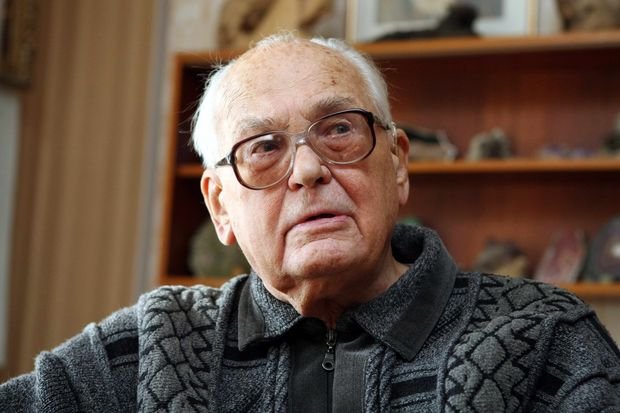Yuri Tkacz on Anatoly Dimarov
Anatoly Dimarov (Wikipedia article linked here) (1922-2014) is still my favourite Ukrainian writer. Born Anatoliy Harasiuta, his mother was forced in Stalinist times to change his surname to her Bulgarian maiden name Dimarov. And so when I became enthused with his writings as a young diaspora Ukrainian in Australia, and began to translate them into English & publish them, I was chastised by the right-wing political element for choosing to translate Russian authors who write in Ukrainian. I was told by kingpins from UKKA that I should consult with them first who I should be chosing to translate… Yeah, these were old men who had most likely never read anything since leaving Western Ukraine in the early 1940s, and who definitely had no idea at all about what was being written in Soviet Ukraine.
Yes, there was a lot of propaganda, and a lot of drivel, but there were some amazing writers such as Dimarov, Vasyl and Valeriy Shevchuk, Mushketyk, Hutsalo, Antonenko-Davydovych, to name but a few. And I felt the pearls needed to be picked out and shown off to the English-speaking public.
In his final book of prose published in 2013, Anatoly Dimarov was dubbed “a writer for all times and all nations”.
He wrote about people & their relationships, especially within the family. He had a love of people, was very warm and open.
I first met Anatoly in December 1975 on my first trip to Ukraine. I brought with me a cyclostyled literary magazine with several of his novellas which I had translated. Having obtained his address from my grandfather’s penpal in Kyiv, I wrote him in advance that I had translated & published some of his works and wanted to drop them off personally when I was in Kyiv. The letter became “lost” in the post and so I basically appeared one afternoon unannounced on his doorstep. He was probably a little shaken and shocked, for at the time contacts with diaspora Westerners were frowned upon, but he invited me in, and chatted with me for some time, showed me is collection of precious stones, which he adored, and invited me to stay for dinner.
He also introduced me to Yevhen Hutsalo and Vitaliy Korotych, Ukraine’s answer to Yevtushenko at the time, and the future chief editor of Ogonek magazine under Gorbachev
We corresponded after that more or less regularly, some letters never making it across the oceans. When I arrived again in the European summer of 1978 I was able to present him with the book “Across the Bridge”, a Penguin-looking paperback of his novellas & short stories in English. In lieu of an honorarium I brought him some Aussie opals. I popped in twice to visit him in the short time I was in Kyiv and we chatted a lot in his large study cum lounge room, until his wife would interrupt us, setting the table for coffee.
At the time he was being published in Ukraine in enviable editions of 100,000 and yet he denigrated his standing and his work, saying it was a mere hobby and nothing serious. Although he was not a dissident, he was respected by such then dissident authors as Antonenko-Davydovych, for not turning away from those who were dissenting, as many mainstream authors had done.
I learnt from his writing friends that he was a serious prankster. Once, after having a row with his wife he went off to the writer’s retreat in Irpin to work when his friends came to fetch him for lunch, they saw him hanging from a rope in a cupboard, tongue sticking out. They dashed off to the main office and summoned his wife to come urgently, that he had committed suicide. But when she arrived all flustered &upset, she found him at his desk writing. He turned around and asked with surprise:“And what’s brought you here?”
Much later, after the fall of the USSR, he told me that there had been problems in Soviet times because of his meetings with me and our correspondence. His son had been refused a visa to a satellite country, the KGB evidently saying the reason was his father’s contacts with bourgeois nationalists.
Dimarov’s books read so easily, they have so much love of humanity and warmth in them. He never moralises or philosophises, his characters are real people with their tiny flaws and shortcomings, and one even feels sympathy for his anti-heroes.
The world has lost not only a great writer, but also a good human being.
In 2012, on his 90th birthday, Dimarov created waves when he refused a prestigious government award from President Yanukovych, saying he would not accept anything from a man who was driving his beloved country into an abyss.
I last saw Anatoly Dimarov last year. He was a frail old man then, but still with that wry sense of humour and devilish cackle. Despite his age, he took us several hundred yards from his apartment to the Holodomor monument and chatted with us there on a bench. And then back home for a final meal, which his wife prepared, despite having recently returned home from hospital after serious surgery.

